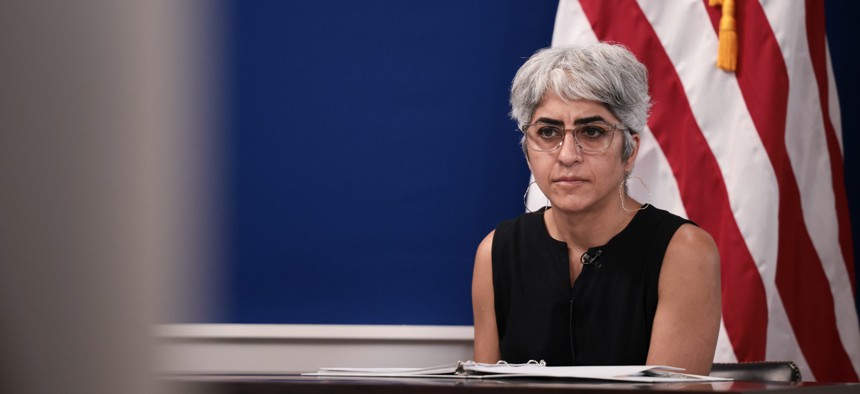
OPM Director Kiran Ahuja, shown here at a White House event in October 2021, wants to extend special DHS and DOD cyber hiring authorities to all agencies. Anna Moneymaker/Getty Images
OPM Wants to Level the Field for Federal Cyber Talent
The federal government's top human resources official wants agencies to be on an "equal footing" when it comes to hiring cybersecurity professionals.
Kiran Ahuja, director of the Office of Personnel Management, told lawmakers on Thursday that her agency wants “to work with Congress to develop a governmentwide cyber workforce plan that puts agencies on equal footing in competing for cyber talent.”
Special cyber hiring and pay authorities at the Department of Homeland Authority create competition for talent among government agencies – something that needs to be addressed, she said along with Jason Miller, deputy director for management at the Office of Management and Budget.
“Congress passed a particular cyber talent program for DHS that has now become sort of … the king of programs within the federal government and other agencies are having to compete with that,” said Ahuja during a hearing of the House Oversight and Reform Committee's Government Operations subcommittee.
Congress authorized DHS to build its Cybersecurity Talent Management System in 2014. It uses the excepted service to offer higher pay, but the department has struggled to capitalize on the system since it launched in last fall.
As of late May, the system had only actually onboarded two employees. The department aims to make 150 hires by the end of September.
The Department of Defense has similar authorities for cyber hiring.
Miller also talked about the need for consistency across government in terms of the tools and strategies federal agencies use to get in-demand talent like cyber workers.
“We do need enough flexibility to be competitive, and we also need to do it in a way that’s consistent across the federal government,” he said during the hearing. “When we have different authorities and different approaches to similar types of jobs and similar types of skills in one agency over another, it creates an imbalance that harms the federal government overall and makes us less competitive in the labor market.”
In his written testimony, Miller wrote that he and Ahuja are collaborating with other leaders in this area as well, like National Cyber Director Chris Inglis, the Federal Chief Information Officer Clare Martorana, and the Federal Chief Information Security Officer Chris DeRusha.
“Some federal agencies have special authorities that give them a leg up in recruiting cyber talent relative to other federal agencies,” Miller testified. “OMB and OPM are partnering with others across the executive branch in exploring the right balance of changes to hiring, pay, and classification to better meet the needs of all agencies’ recruitment and retention of cyber talent.”
Ahuja stated in her written testimony that the plan to equalize agencies might require “new authorities with respect to classification, hiring and pay,” and also flagged the use of skills-based hiring as a priority “to make sure the government gets the right cyber candidates.”
She also told lawmakers that OPM has proposals around increasing pay for experts.
OPM is currently “working to identify ways to allow higher special pay rates” for cyber employees as well as for feds working in science, tech, engineering and healthcare jobs,” according to her written testimony.
Previous OPM efforts on the cyber talent issue have focused on spotlighting existing recruitment and retention tools
This conversation is happening as public and private sectors alike are starting down a talent shortage in the cybersecurity field – currently, there are around 700,000 open cyber jobs – that leaders say is hampering the nation’s ability to combat cybersecurity threats.
“This is something that I am very focused on,” said Miller, pointing to a White House summit held by National Cyber Director Chris Inglis earlier this week.
“The federal government needs more talent in house,” he continued. “OMB released a zero trust strategy that our agencies are implementing over time. We need the people to be able to do that.”







